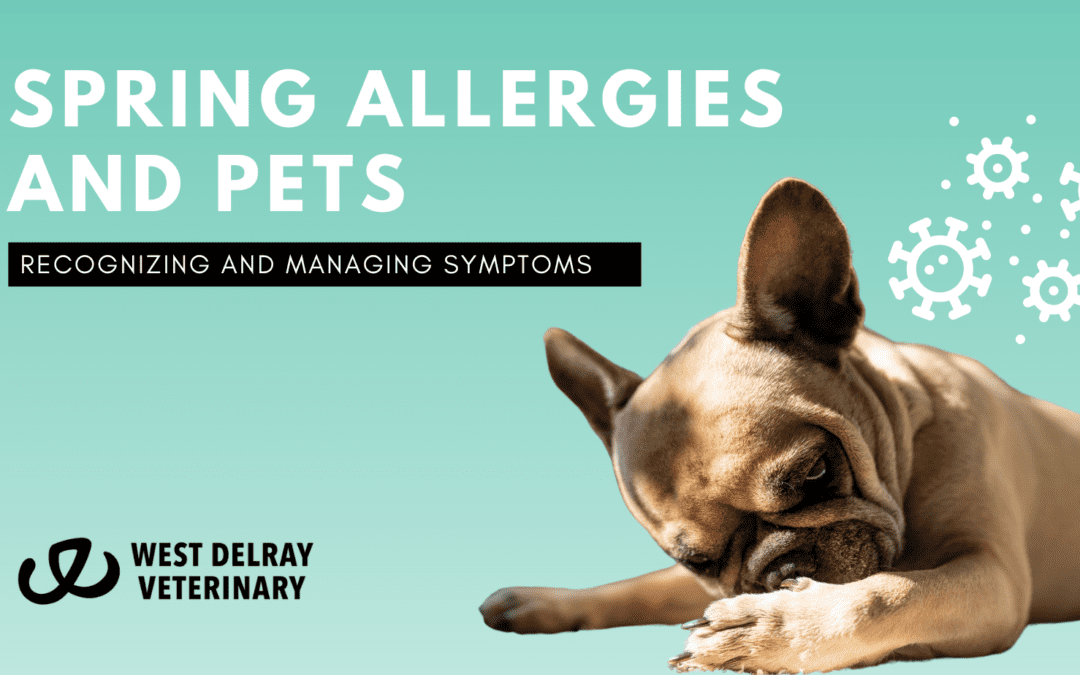With flowers in bloom, brilliant colors, and the prospect of warmer days, spring is a season of rebirth. Spring allergies, on the other hand, are an unwelcome consequence for many pets. Our four-legged friends are susceptible to allergies such as mold, pollen, and other seasonal allergens. In this blog post, we’ll look at common allergens that affect pets and offer advice on how to identify and treat spring allergies with conscientious environmental changes and veterinary care.
Identifying Common Allergens:
The first step in assisting our pets with spring allergies is to comprehend the causes of these allergies. One of the main causes is pollen from grass, trees, and weeds; another is mold spores, which are attracted to moist environments. Furthermore, some insect venom or saliva can trigger allergic reactions in pets. Important clues can be found by monitoring your pet’s behavior and any apparent changes in their health.
Identifying Symptoms:
It’s important to be on the lookout for possible allergy symptoms because pets might not be able to alert us when they’re feeling under the weather. Things to look out for include:
- Excessive Scratching: Allergies may be the cause of your pet’s excessive scratching, rubbing the body, or licking.
- Watery Eyes: Discharge from the eyes can be watery, thick, or even a milky color.
- Sneezing or congestion: These signs may or may not occur along with discharge from the nose.
- Ear Infections: Allergies may be a contributing factor for some ear infections, which can cause discomfort, red ears, and/or head shaking.
- Behavior Changes: An allergy may cause your pet to become agitated or lethargic, so keep an eye out for any behavioral changes in your pet.
Mindful Veterinary Care:
Prompt veterinary care is essential for treating spring allergies in pets. A veterinarian may conduct allergy testing to pinpoint particular triggers and suggest a course of action. This could involve corticosteroids, antihistamines, or other medications or supplements that are specific to your pet’s needs. Never self-diagnose or use over-the-counter medications without the guidance of a veterinarian.
Environmental Changes:
Although veterinary care is crucial, you can also help your pet’s allergy symptoms at home by implementing the following small adjustments:
- Regular Grooming: Giving your pet regular baths and brushings can help reduce their exposure to allergens by removing them from their fur. Wiping your pets coat or paws with pet wipes, a moistened cloth or even unscented baby wipes can also help remove allergens from the skin and coat.
- Clean Living Spaces: To reduce indoor mold, dust, and pollen, vacuum and clean your house frequently.
- Filtered Air: To make your pet’s environment more comfortable, think about utilizing air purifiers to eliminate allergens from the air.
- Humidifier: Increased humidity in the area can help reduce mucus build up in the nasal passages and/or airways secondary to allergic inflammation.
It’s important that we consider our pets’ comfort and identify possible signs of allergies as spring approaches. It takes a combination of thoughtful observation, veterinary care, and deliberate environmental modifications to identify and manage spring allergies.
Make your pet’s health a top priority this spring. For individualized care, make an appointment with one of our veterinarians. If you observe any symptoms of allergies, visit West Delray Veterinary at 15065 FL-7 Suite 750, Delray Beach, or call (561) 777-7173. Let’s work together to ensure that our cherished friends have a joyful and healthy spring season.

